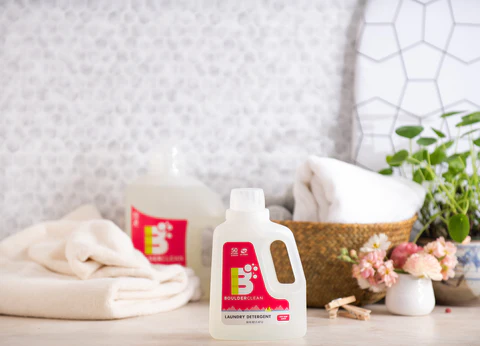Interviews With An Expert #3: A Closer Look At Our Laundry Detergents
How Boulder Clean’s Plant-Based Laundry Detergent Rises Above The Rest
You can wash your clothes as often as you like, on whatever settings you want but everyone knows that no matter what you do to try to keep them clean, the most important factor is your laundry detergent. Using the wrong detergent can leave your clothes looking dull, smelling…not so great, feeling rough and worn, and really not that clean. We get it, the detergent market is saturated. There are hundreds of different brands, there are liquids and gels, pods and powders, it can get overwhelming! Amid all the detergent mayhem, you’ll find Boulder Clean. So what makes us rise above the rest? Time and time again Boulder Clean’s Laundry Detergent has proven to outperform competitors, not just in how well it washes your clothes, but also in the quality of ingredients.
To truly help you understand how Boulder Clean’s high-quality, plant-based ingredients work to tackle those tough stains, while keeping the environment in mind we called in the experts! Below we break down some of the stand out ingredients in our detergents, how they work, and ultimately why they’re better for our planet (and you!).

How do Sodium Laureth Sulfate and Sodium Polyaspartate work to clean laundry?
Sodium Laureth Sulfate, commonly referred to as SLES (not to be confused with SLS), is an plant-derived cleaning agent. Since it is a surfactant, it will break water tension and attract dirt and grime away from clothing fabrics during the wash cycle. The soil is suspended and can be rinsed away during the rinse cycle. Polyaspartate is a plant-derived suspending agent. It works in tandem with the SLES to keep the soil suspended so it can be rinsed and not redeposited on the clothing. The polyaspartate also serves as a water softener, by bonding to calcium and magnesium ions and removing them during the rinse cycle. Hard water has high mineral content of magnesium and/or calcium. Laundering clothes in hard water can leave mineral deposits on the clothes that attracts soil and causes white clothing to lose brightness and look dingy.
What is the difference between SLS and SLES?
Sodium Lauryl Sulfate (SLS) is the parent chemical that is modified to make Sodium Laureth Sulfate (SLES). It’s created through a process called ethoxylation (in which ethylene oxide is introduced) changing the makeup of the compound. This process is key because it turns SLES into a safer, less harsh chemical than its predecessor.
SLS is well-known as a skin irritant when left on the skin for prolonged periods of time and can lead to cracked, dry and tender skin. In recent years, it has picked up a considerable amount of attention across the internet with rumors of it being linked to cancer, however, there has been no evidence that SLS is linked to this in any way.
On the other hand, SLES does the same cleaning and emulsifying job but is far less likely to aggravate your skin (phew!). SLES is much gentler and doesn’t strip the epidermis of any excess moisture, leaving it feeling soft, smooth and nourished.
What are enzymes? Why do we include them in our laundry detergent?
Enzymes are materials that catalyze a chemical reaction without being altered themselves. We use enzymes in our laundry detergent because they bind with soils, and cause the soils to break down, making them easy to remove in laundering clothes. There are different types of enzymes, which attack different soil types, we tend to use Protease and Amylase.
How does Protease work to remove stains?
Protease is an enzyme which will break down protein based soils to help removes these soils from clothing while they are being washed. Common protein soils are egg, gravy and even blood.
How does Amylase work to remove stains?
Amylase is an enzyme which will break downs starch-based soils to remove these soils from clothing during laundry cleaning. Common starch soils are rice, potato and guar gum thickener used in many foods.
How are plant powered detergents better for the environment?
Plant powered detergents, made from plant-derived ingredients, are better for the environment for a few different reason. The first being, plant-derived detergents are preferable to petroleum base products which are limited due to the depletion of our fossil fuels. Secondly, plant derived ingredients are renewable and sustainable, which allows humans and our environment to co-exist. And most importantly, plant-derived detergents are biodegradable so they do not leave a negative impact on the Earth’s water supply!
How are plant powered detergents better for my clothes (and me!)?
To put it most simply, Boulder Clean’s plant powered detergents, are exactly that—plant powered! Unlike other detergents on the market, they are free of bleach, phosphates, SLS, and dyes! The result? A powerful, stain lifting clean, that is tough on dirt and grim but gentle on your skin and favorite clothes, blankets and more!
Looking for more Interviews With An Expert?
Interview #1: Breaking Down the Scary Sounding Ingredients
Interview #2: Understanding the Disinfecting Line
Interview #3: A Closer Look at Our Laundry Detergents
Interview #4: Our Plant-Based Fragrances & Dyes
Interview #5: Why Are We Plant-Based?
Interview #6: What’s Up With Cleaning Tablets?
Interview #7: How Power Sport Laundry Tackles Your Toughest Odors
Interview #8: Learn All About Our Refill Cleaning System
